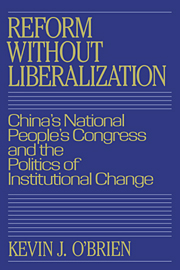 Reform without Liberalization
Reform without Liberalization 1 - Chinese legislatures and political change
Published online by Cambridge University Press: 22 March 2010
Summary
Chinese legislatures have had a short and turbulent history. First established in the final decade of the Qing Dynasty (1644–1911), popular assemblies have rarely acquired considerable power, persisted for long, or drawn the attention of foreign scholars. The national legislature set up under the Communists is no exception. Since its founding in 1954, the National People's Congress (NPC) has “traversed a winding and tortuous road of development,” with more than its share of detours and wrong turns. A period of legislative activity and reform in the mid-1950s ended suddenly when a series of policy shifts reversed a trend toward institutionalization and reliance on law. For two decades, political campaigns, from the Anti-Rightist Movement (1957–8) to the Great Leap Forward (1958–60) to the Cultural Revolution (1966–76), interrupted legislative development and ultimately drove the NPC into inactivity. For the last ten years of Mao Zedong's life, a legislature whose ancestry was in the “revisionist” Soviet Union and the “capitalist” West had no place in the Chinese political system; it was ignored and scorned, called a “rubber stamp” or a “phony organ of idle talk.”
Then, in the autumn of 1976, Mao died. His passing ushered in a new era in Chinese politics – one that brought a reassessment of past policies and a series of political reforms, including revival and strengthening of the NPC. Beginning in 1978, party leaders convened people's congresses each year and encouraged lively debate.
- Type
- Chapter
- Information
- Reform without LiberalizationChina's National People's Congress and the Politics of Institutional Change, pp. 3 - 11Publisher: Cambridge University PressPrint publication year: 1990


